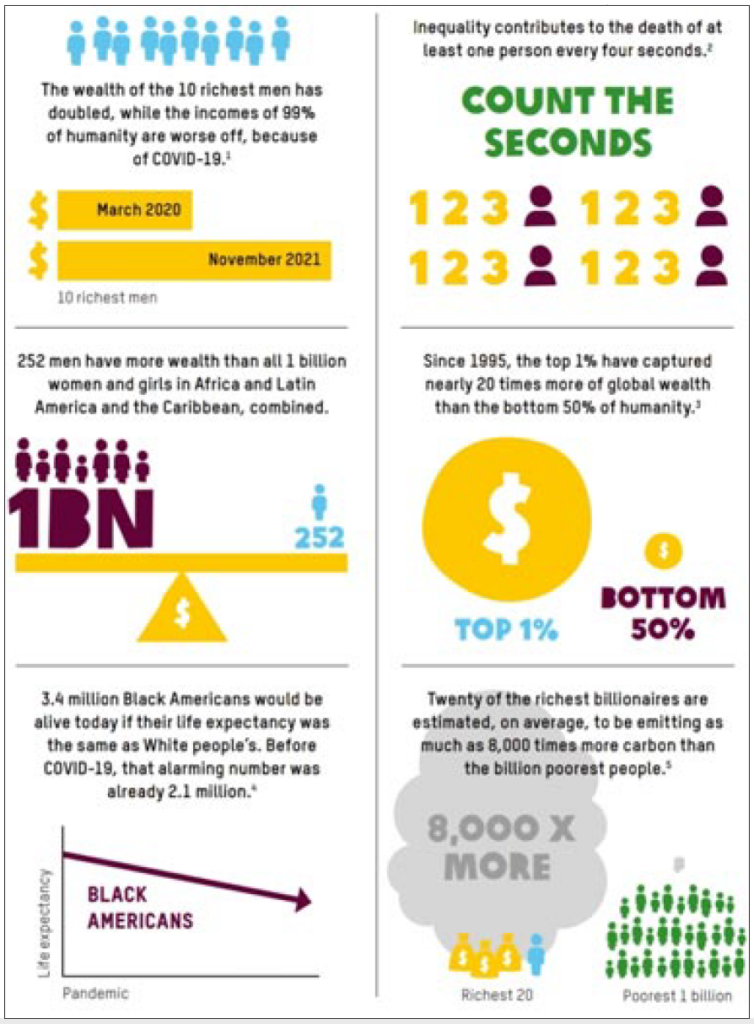The UN secretary-general, António Guterres, during the peak of the covid pandemic, said that “we are all in this together.” But, on the contrary, two newspaper articles provide evidence to believe otherwise.
The Irish Examiner reported that the wealth of nine Irish billionaires increased by 58 per cent since the beginning of the covid pandemic, based on an Oxfam report. The report also said that the billionaires’ wealth grew to €49.7 billion. If the millionaires owning more than €4 million were taxed a mere 1½ per cent of their wealth it could raise €4 billion; and if billionaires were taxed at the same rate it could raise €0.7 billion.
There was another article in the Irish Times that said there is a debt of €47,000 on every man, woman and child in Ireland. The national debt seems to have increased from €227 billion in the third quarter of last year to €236.3 billion in the third quarter of this year. The reason given is that the increase in debt is due to government spending on wages and pandemic-related expenses. The paper says Ireland has one of the highest debts in the world per capita, which could make it susceptible to severe economic crises in the future.
The questions that arises in people’s mind are:
- What prevents the Government taxing the richest people in Ireland?
- How did so much debt per capita originate?
- Why do the ordinary people of Ireland have to pay the debt they did not cause?
Transnational corporations, especially American ones (€165 billion in 2011), are the main investors in Ireland. These corporations contribute 70 per cent of Irish exports. So in order to sustain these investments, and attract more, Ireland has to become a tax haven and create an environment of low corporate taxes, even though it is finding it hard to find resources for its budget.
If the Government attempts to tax the transnationals, the flight of capital from Ireland will compound the economic issues and create a downward spiral. Therefore it is reluctant to tax the rich corporates.

During the crisis of 2008, when six banks collapsed, they had to be bailed out, with the state providing €70 billion for recapitalisation by borrowing from imperialist institutions, such as the International Monetary Fund, so that the banks could continue supplying money for the Irish economy. The troika of the EU Commission, EU Central Bank and IMF agreed on financial aid with strings attached, in the name of “austerity,” which means cutting government expenditure on welfare and increasing tax, which has a catastrophic effect on the economy and heavy social impact.
The neoliberal agenda proposes fiscal discipline and policy on the budget. In a budget the government decides in which areas it wants the money to be spent (expenditure) and creates sources to meet the expenses by taxation (income). The difference between expenditure and income is the budget deficit.
Fiscal discipline of the neoliberal policy-makers creates a straitjacket that forces governments to maintain the budget deficit within 3 per cent of GDP. So the Government has two options: either increase income or reduce expenditure. To increase income it has to tax the big corporations, which it is afraid to do, because of the fear of the flight of capital, which would cause an economic catastrophe; so the only other option is to reduce expenditure. This results in reduced spending on the people’s welfare.
The newspaper that said that expenditure on wages during the pandemic was the reason for the increased debt shamelessly camouflaged the real cause of the debt. To put things simply, the insolvency of the banks was made a sovereign debt, and this was made people’s debt. The profit made by the speculative trading of banks went into private pockets, while losses caused by bank mismanagement were made public. The CEOs of the banks earned billions while their mismanagement, which caused the banks to collapse, was made into a debt that ordinary people have to pay, in the form of increased taxes and suffering under “austerity.”
Neoliberalism—which even during a pandemic increases the wealth of billionaires and at the same time increases the debt on ordinary people—is inhuman; which means that capitalism has to be abolished: it cannot be reformed.
The pandemic has had different effects on different classes. So “we are not in this together.”






